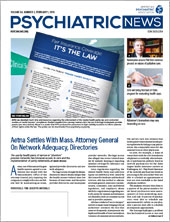Over 30 million U.S. adults took benzodiazepines in the past year, including 5.3 million who misused the medication, according to a study posted December 17, 2018, in Psychiatric Services in Advance.
The findings, which were based on an analysis of data collected as part of a national survey in 2015 and 2016, suggest that annual benzodiazepine use among U.S. adults may be more than double estimates based on data collected in 2013 and 2014. The findings also point to those most likely to take the medication without a prescription or in greater amounts or over longer periods of time than prescribed.
In the study, researchers analyzed data about adults age 18 and older who participated in the National Survey on Drug Use and Health (NSDUH) in 2015 and 2016. The data were extrapolated for the U.S. population. The annual NSDUH asks participants about substance use, mental health, and more. Overall, 30.6 million adults, or 12.6 percent, used benzodiazepines in the previous year. Other studies such as the 2013-2014 National Health and Nutrition Examination Survey and the Medical Expenditure Panel Survey suggested that between 4 percent and 5.6 percent of adults took benzodiazepines.
Differences in the survey design may account for the increase in use reported in the most recent NSDUH, said lead author Donovan Maust, M.D., M.S., an assistant professor of psychiatry at the University of Michigan and a research scientist in the Center for Clinical Management Research at the VA Ann Arbor Healthcare System.
“Beginning in 2015, the survey included questions about both as-prescribed use and misuse of prescription medications. This may partially explain why the NSDUH estimate is higher compared with other surveys that capture only prescription use,” Maust said.
Overall, 20 percent of benzodiazepine use was misuse. The most common form of misuse was use without a prescription, and the most common reasons for misuse were to relax or relieve tension and to help with sleep. Adults aged 50 or older were more likely than their younger counterparts to take benzodiazepines more often than prescribed and more likely to use them to sleep. However, misuse decreased with age, with adults over 65 least likely to report misuse. In contrast, 51 percent of participants aged 18 to 25 reported misuse, and they were more likely than older adults to misuse benzodiazepines to get high.
“Because benzodiazepines are so commonly prescribed to older adults, it was reassuring that misuse among adults over 65 was lowest of all the age groups. They generally take these medications as prescribed. For initiatives aimed at curbing misuse, you have to focus on younger adults because so much of their use is misuse,” Maust said.
Alprazolam was by far the most common benzodiazepine misused, the choice of 75.1 percent of those who misused benzodiazepines.
“Xanax is short acting and high potency. It brings a sense of relief but then has a strong on-off effect, which makes for greater misuse or abuse potential. When you take it and it wears off, you might be more inclined to take an extra dose,” Maust explained.
Andrew Saxon, M.D., chair of APA’s Council on Addiction Psychiatry, said the study’s results bolster the case for using caution when prescribing alprazolam.
“It really has no clinical advantages over safer benzodiazepines (for example, oxazepam and lorazepam) when prescribed for appropriate purposes, so it would be good to educate the physician workforce that when prescribing a benzodiazepine is indicated, alprazolam is not the best option,” said Saxon, who was not involved in the research.
The study also offered insight on concomitant use and misuse of other drugs. Opioid misuse and abuse or dependence were most strongly associated with benzodiazepine misuse. Use or misuse of marijuana or alcohol also increased the likelihood of misusing benzodiazepines.
“Alcohol, tobacco, heroin, other opioids, and stimulants probably confer much more risk than do benzodiazepines themselves. In that sense, it is probably more important to address the misuse of these other substances while taking into account the benzodiazepine use,” Saxon said.
Saxon added that although benzodiazepines should be prescribed carefully, they do benefit patients. “We shouldn’t overreact and start trying to take all patients off benzodiazepines. The study confirms that most benzodiazepine use is by patients with a prescription who do not misuse the medication.”
Maust said that the key to successful prescribing is to begin with the end in mind.
“Benzodiazepines should always be started at the minimum dose with a very clear expectation that it’s meant to be a short-term thing. Patients should understand the risks of the medication, the short-term plan for treatment, and the plan to end so that everyone is on the same page,” Maust said.
This study was supported by the National Institute on Drug Abuse. ■
“Benzodiazepine Use and Misuse Among Adults in the United States” can be accessed
here.


